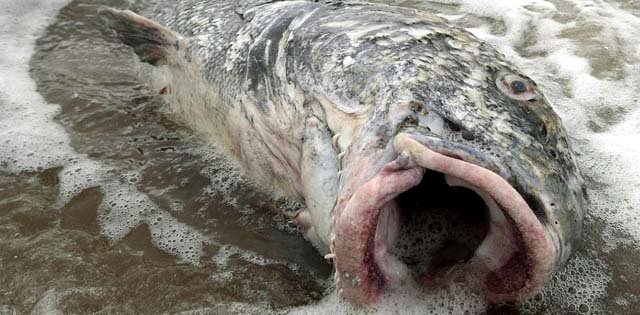
Lake Megantic Quebec - Two-and-a-half years after a train carrying millions of gallons of crude oil derailed and exploded in the small Quebec town of Lake Megantic, scientists are finding deformities in the fish living in nearby rivers.
That's led the government to a revelation, crude oil is bad for fish.
No shit.
What is shocking, however, is the extent of the problem.
The rate of the deformations in one sample was found to be ten times higher than normal.
The 2013 derailment of a freight train carrying oil intended for a New Brunswick refinery kindled a blaze that claimed 47 lives in the eastern Quebec town and dumped an estimated 26,000 gallons of crude into the nearby Chaudiere River.
It was revealed this week that a government commission studying the contamination has found the fish in the Chaudiere, which flows into the Saint Lawrence, to have "unprecedented" levels of deformities.
In its second report, issued in November but first reported Wednesday by Le Devoir, the Quebec government's scientific panel found that oil is still lingering in sediments on the riverbed and that the years since the disaster have seen a dramatic increase in the presence of lesions, fin erosion, and other deformities in many species of fish.
Normally such abnormalities are found in fewer than five percent of fish, and back in 1994 their occurrence was even lower in the Chaudiere, the report states.
But in the year following the oil spill the river's fish showed much higher rates of deformity, with two samples reaching 35 and 47 percent.
The study also noted a significant drop in river's fish biomass, or collective weight.
"In addition to being much higher than in 1994, the rate of anomalies in the Chaudiere River in 2014 significantly exceeded what is generally observed in all other waterways of Quebec," the report states.
"These high rates are attributable, in all likelihood, to the July 2013 oil spill."
Although the spilled oil still seems to be affecting the fish, the waters of the Chaudiere are largely free of it, and the scope and concentration of oil in the riverbed has fallen significantly since 2013.
The persistent impact on the fish didn't surprise Isabelle Picard, an aquatic biologist, who said toxins in the sediments where fish spawn are a major driver of deformities.
Picard pointed to the high rate of deformities, especially among less susceptible small fish, around Lake Megantic as a sign of the enduring and alarming environmental impact of the tragedy.
"When there's a spill most people look at short term effects, water quality, and how many fish die," she said.
"But you have to look at the long term. There's still contamination there."
Other scientists point to Lake Megantic as a reminder that oil spills can dangerously pollute drinking water.
In the immediate aftermath of the 2013 train crash all of the communities along the Chaudiere were forced to temporarily find alternative source of drinking water.
And in recent years, the flow of oil passing through Quebec has grown, Sarah Dorner, Canada Research Chair in source water protection at Polytechnique Montreal, told VICE News.
Whether by pipeline or rail, moving oil comes with risks.
As in Lake Megantic, rail has the potential for catastrophic crashes but spills are relatively small compared to leaks from high volume pipelines like Energy East.
The Union of Quebec Municipalities, which includes Lake Megantic, opposes the nearly 3,000 mile pipeline and Dorner explained this in terms of the risk the province's largest city's water supply.
"If you look at Montreal... it's an island," she said.
"It's not like you can quickly get water from a different source."
Jake Bleiberg.


